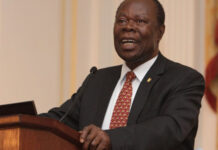
Technology has advanced and enhanced our way of communication so much over the last two decades with the development of applications and software.
The introduction of smartphones and its accompanying applications have infiltrated our personal lives and workplace. It has become a necessary evil since it has brought a lot of improvement in human interactions. It has eased pressures at work and minimized the wasting of time on a single task.
However, it comes with its own challenges in diverse ways; the use and addiction to social media such as Facebook, WhatsApp, Twitter, Instagram, Snapchat, LinkedIn and blogs in the workplace is on the rise and almost becoming alarming. Social Media should be an avenue for increasing brand visibility in our catchment areas, increase our mileage to potential customers and become a brand of choice. It is expected to give out enough information on products and services to the general public.
On the other hand, social media is user friendly so much that people have developed passion for its usage even to the extent that they are tempted to log on during working and productivity hours. All these happens at the expense of employers most of the time. Many organizations are very active on social media and uses it as a major advertising tool. At the click of a button; marketers and brand managers can reach out to millions of people.
LinkedIn for example is a professional networking tool where many recruiters have hired excellent professionals. There is an emerging trend where organizations have created WhatsApp groups for projects and assignments. You even come across these groups created amongst teams members for information sharing – in a subtle way, it has been an instrumental avenue to care for our colleagues and show them love in diverse ways.
So to this effect, it’s no surprise that the distinction between professional and personal use can be unclear. By observation, its usage is more frequent in the workforce between the ages of 18 to 45. Even in this demography, its addiction is more with the millennials generation. The most challenging aspect of it is that, all the social media applications can be downloaded on mobile phones unlike some years back when one needed to log unto a computer. From all indications, social media has come to stay but the question is – is it meant for the workplace? Let’s consider a few pros and cons of social media and again attempt to offer tips to ensure its appropriate use and put a caveat on its usage during working hours.
- Empowered employees – not every employee can have the opportunity to share his/her view but activating social media can serve that purpose, it breaks the communication barrier where employees can engage their leadership. It guarantees a sense of belonging amongst the lower level employees.
- Productivity – it serves as a stress reliever, employees can take a break from a difficult task, scan through events and posts on social media and come back refreshed and energized for work. People can share ideas with colleagues on a rather difficult assignment, and in most cases get immediate results from peers through social media.
- Information Flow – information can be shared on various platforms and every employee gets access to it instantly without any third party intervention. It avoids the adulteration of the message and encourages active participation. It reduces the use of emails and memo’s as the only means of communicating with employees and again addresses the convenient excuse “I haven’t read my mails” since we are with our phones more often than not.
- Recruitment – when considering engaging the services of Millennials; social media becomes your surest bet. They are attracted to organizations that are tech savvy and have a lot of social media presence. LinkedIn has assisted many HRs in this regard. Chatbox for example is a tool that recruiters can use in hiring the best of talent in the labour market.
- Data Analysis and Feedback – by subscribing to social media also means divulging some personal information about yourself. This offers employers the chance to carefully identify employees with particular skill set, experience and exposure. It helps HR gather data on current employees and therefore can make projections and advice management accordingly. It serves as a means of getting feedback from customers on products and services offered to them.
- Social Selling – through social media, every employee becomes a brand ambassador. Uploading, sharing and liking of information of your organizations product and services is the best advertisement any organization can get. Videos targeted at segmented customers can be uploaded at a minimal cost. It increases brand visibility and boost confidence in your image. Using Twitter, Facebook and LinkedIn is a reliable vehicle for breaking barrier into business growth.
- Cybersecurity – individuals and organizations have been faced with cybersecurity. Hacking into sensitive, vital and confidential information can cause major financial loss, it reduces customer trust and confidence in businesses. We have heard and watched many scandals through social media – it is therefore important to have a sophisticated means of protecting company data and customer confidentiality. Society for Human Resource Management (SHRM), the world’s largest HR professional society argues that using social media platforms on company networks opens the door to hacks, viruses and privacy breaches.”
- Abuse of Social Media – regrettably, a large number of employees will abuse work-related social media privileges. There should therefore be a proper framework and strategies to effectively manage, monitor and evaluate social media activity related to the brand and services offered.
- Productivity Loss – some workers use social media whiles at work to interact and engage with family and friends, this will obviously lead to a loss in productivity at work. SHRM agrees: “Some employees may spend an inordinate amount of time on social media for personal reasons whiles at work.” Such attitudes become overbearing to the growth and sustainability of the business.
- Oversharing – when coworkers have unlimited access to one another’s social media posts, it opens the door to potential oversharing. According to Pew’s research, millennial employees and to a large extent other employees have seen social media posts that damaged their opinion of coworkers. The risk of such opinions and publications negatively affects their working relationships.
Organizations can really manage, control and benefit from the use of social media. HR professionals and compliance units must develop and implement a clear policy for employees on the usage of social media – writing such policy must involve the inputs of employees – in such policy should be the non-disclosure clauses that limits the sharing of confidential information. We should be mindful of information we share so we don’t expose ourselves and organizations to unnecessary media scrutiny.
It must be clear if employees can use their personal accounts for work-related social media activities. Giving access to social media can be regulated by limiting it to non-working hours that is to say before work starts and after work and possibly during lunch breaks. There should be the continuous engagement to ensure that employees limit time spent on social media at work. People should be circumspect and sensitive before sharing information with team members or other colleagues. Disclosing information on social media can expose you and your organization to avoidable spam, pranks etc. and increases your risk to hacking and infiltration into your IT network.
The world of work has evolved and we must take advantage of it – we can have interactive sessions with customers all over the world through live streaming, podcast etc. Also e-learning applications can be downloaded on smartphones – this brings a lot of convenience to all parties involved.
Generally there is the support for social media at work but one must be mindful of what he/she shares, any material shared on social media forms part of writing your history and serves as a reference point for recruiters. What you share or like without considering its implication on your career and personal lives can pose a threat to your future opportunities. Share information that will help build your career and protect your brand image. Try and avoid any situation that will create enemies for yourself and requires of you to defend stuff you are not convinced about. After all its social media and a virtual world – some of your friends who influences you negatively are people you may never meet in real life.
Name: Bright Ampadu Okyere | Tel. #: 0244204664 | Email Address: hrtoday@gmail.com




